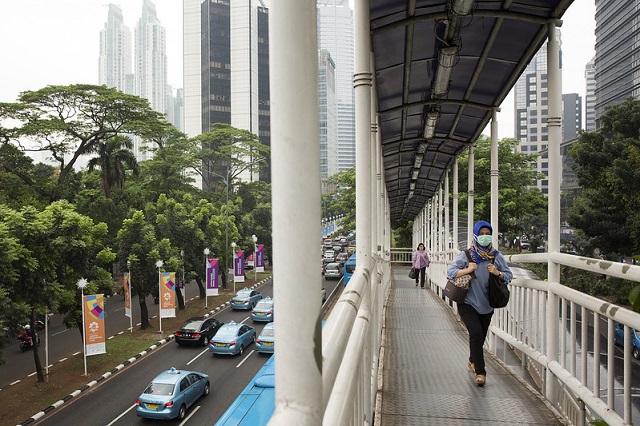
The sheer volume of data collected globally has grown exponentially. But particularly in developing and emerging countries, major gaps in availability, quality and usability of data lead to a lack of significant resources necessary to face complex urban challenges. The Transformative Urban Mobility Initiative (TUMI) – funded by the German Federal Ministry for Economic Cooperation and Development (BMZ) – believes that for cities, data is a crucial enabler to make better as well as more informed decisions about sustainable mobility. With the development of an Urban Mobility Data Hub, TUMI is working together with its partners on making mobility data available for 40 cities in Africa, Latin America and Asia to shape the digital transformation of urban mobility in a climate-friendly way.
Urban development and transport are interconnected. Cities are growing rapidly, leading to overall growth in travel demand. Reaching a certain degree of saturation in industrialized countries, urban and transport development is progressing in other regions of the world with incredible dynamism. Especially in developing and emerging countries, unplanned urban growth is a challenge for achieving sustainable urban mobility.
To shape future climate-friendly transport, it is crucial for cities to understand their complex mobility ecosystem. This is where data analysis and visualization play a key role in anticipating the need for mobility services at an early stage and responding accordingly. Mobility data thus enable well-founded policy and investment decisions so that transport modes can be efficiently adopted and used.
Gaps in Coverage, Quality and Usability of Data
With the digital revolution, accessibility of data has greatly increased, as well as ease of information sharing. But developing and emerging countries are being left behind. Despite the value of public intent data, particularly in developing and emerging countries, gaps in their availability, quality and usability persist. For example, 35% of the world’s largest cities and 92% of the largest low- and middle-income cities do not have complete land use or transportation maps.
Conventional land use maps, which divide the earth’s surface into categories such as “forest,” “water” or “tundra,” often group urban areas into a single category – such as “urban” or “built-up” – and do not reflect the complexity of urban spaces. OpenStreetMap, a citizen-generated geospatial application that relies on users to digitize the location of roads and other infrastructure, shows a clearly lower coverage in lower-income countries. In India, only 21% of the road network had been digitized by 2015. Additionally, adaptation of technologies such as ground-based sensors, which can measure air pollution or climatic conditions, is still too limited to provide data at scale.
There is often partial data on movement patterns and mobility, but timeliness remains an issue particularly with survey and census data. In addition, it is often not accessible to decision-makers. Often, cities lack the know-how to make use of this data and incorporate it into the practices of local governments. There is a lack of concrete, data-based application examples to make the CO2 reduction and scaling potential in this area tangible.
What TUMI Is Doing to Bridge the Data Divide
Bridging the digital divide is a social and economic imperative. In cooperation with the Latin American Development Bank (CAF), TUMI is developing a virtual Mobility Data Hub, where open data relevant for urban and transport planning will be made accessible. A key component of the hub is the cooperation between TUMI and ETH Zurich.
Developed by students at the university, high-resolution satellite imagery is being converted into a physical representation of cities with the help of artificial intelligence to be made usable for decision-makers and planners in urban and mobility development. These data will be supplemented by mobility data from different sources (e.g., phone data, GTFS, GPS, LiDaR) to form a comprehensive data basis for integrated transportation and mobility planning. Another important data input will be the collection of gender-specific data, which is currently being collected in three African cities – Lagos, Nairobi and Gauteng – under TUMI’s Women Mobilize Women Initiative. TUMI is committed to highlighting socioeconomic and gender-specific data biases at an early stage.
The final element will be to pilot use cases in three cities, putting the Data Hub to use. TUMI will work closely to assist with mobility planning through the use of the data hub. We will jointly work to utilize the advantages of data-driven city planning, transport development and digitization of information. This will test and improve the versatility of the tool just built. Further engagement with the tech world will be adopted with localized and innovative demonstration activities such as hackathons or design thinking workshops with local stakeholders.
If cities miss out on the digital revolution, they risk losing out on the transformation and climate resilience benefits that can come with sustainable mobility. TUMI is seeking to build the future of qualified experts and decision-makers to drive the change needed in every city. Improving digital literacy and providing relevant skills to the respective government employees to make data-based, sustainable decisions in the field of transportation and mobility planning is key.
Only if we make data available for all people, can we improve the quality of life in our cities and allow policymakers to make data-driven decisions that provide citizens with more efficient and sustainable mobility services and create a more livable, resilient and inclusive city.
This article was originally published in Internationales Verkehrswesen Magazin (74) Issue 1, 2022.
Editor’s Note: WRI is a partner of the Transformative Urban Mobility Initiative (TUMI) through the E-Bus Mission Project, a global coalition of stakeholders assisting with the transition to electric public transit in 20 deep-dive and up to 500 mentee cities.
Frederic Tesfay is Project Manager at the German Agency for International Cooperation (GIZ).
Lena Plikat is Junior Advisor at the German Agency for International Cooperation (GIZ).






